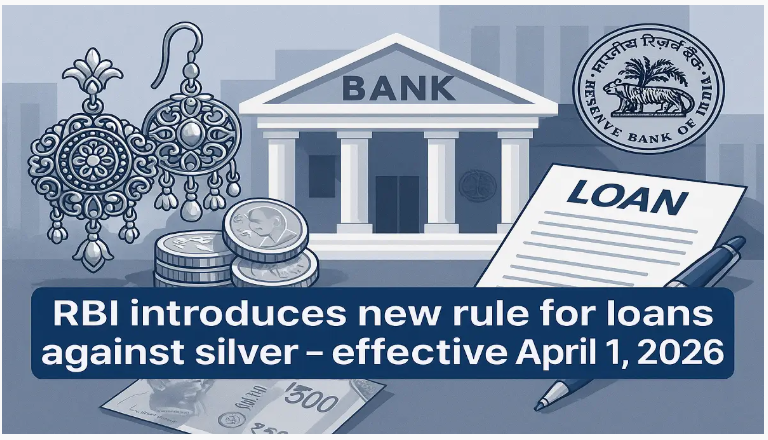RBI’s Introduces New Rule on Loans Against Silver
Table of Contents
RBI’s Introduces New Rule on Loans Against Silver (Effective April 1, 2026)
The Reserve Bank of India has announced new guidelines permitting banks and NBFCs to extend loans against silver from April 1, 2026. The move is aimed at enhancing credit access and liquidity, especially for households and small businesses in rural and semi-urban areas. For the first time, the Reserve Bank of India has allowed banks and NBFCs to extend loans against silver similar to gold loans already available in India. The move expands access to formal credit and promotes financial inclusion, especially for rural and semi-urban borrowers. RBI Issued under direction under RBI (Lending Against Gold and Silver Collateral) Directions, 2025 which is effective from April 1, 2026. Loans Against Silver has following Benefits as mentioned below:
- Increased Liquidity: Unlocks value of silver holdings for households and small businesses.
- Enhanced Credit Access: Provides a new borrowing avenue for rural and semi-urban borrowers.
- Financial Inclusion: Recognizes silver as a legitimate economic asset within the formal financial system.
Objective of the Move by RBI’s New Rule on Loans Against Silver
- Broaden access to formal credit for households and small businesses.
- Recognize silver as a legitimate economic asset.
- Reduce reliance on informal moneylenders and pawn brokers.
- Ensure transparency, borrower protection, and standardized valuation in metal-based lending.
Eligible Collateral as per New Rule on Loans Against Silver
In case on Loans Against Silver only Eligible Lenders can provide the loan and Eligible Lenders is Commercial Banks; Cooperative Banks (Urban & Rural); Small Finance Banks; Regional Rural Banks (RRBs); NBFCs and Housing Finance Companies
- RBI’s New Rule on Loans Against Silver Permitted:
- Silver ornaments: up to 10 kilograms per borrower
- A Silver coins: up to 500 grams per borrower
- Gold ornaments: up to 1 kilogram
- A Gold coins: up to 50 grams
- RBI’s New Rule on Loans Against Silver is not permitted:
- Silver bullion (bars, bricks)
- Financial assets backed by silver (like silver ETFs or mutual funds)
Implications for the Rural Credit Market
- Expanded Credit Reach: Rural households gain an additional formal borrowing channel, reducing dependence on informal lenders.
- Boost to Rural Economy: Enhanced access to funds can support agriculture, microenterprises, and local trade.
- Promotion of Financial Inclusion: Encourages formal recognition of silver savings as collateral.
- Competitive Lending Environment: Expected to drive competition among banks and NBFCs, possibly leading to better interest rates and innovative loan offerings.
- Risk Management Needs: Lenders must adopt effective valuation, storage, and insurance mechanisms to manage silver price volatility and custodial risks.
Loan-to-Value (LTV) Ratio under RBI’s New Rule on Loans Against Silver
| Loan Amount | Maximum LTV Ratio |
| Up to INR 2.5 lakh | 85% |
| INR 2.5 – INR 5 lakh | 80% |
| Above INR 5 lakh | 75% : |
In simple words Loan-to-Value (LTV) Ratio is Up to 85% for loans up to INR 2.5 lakh; then 80% for loans between INR 2.5 lakh and INR 5 lakh and 75% for loans above INR 5 lakh. Example: If your silver is valued at INR 1 lakh, you can get up to INR 85,000 as a loan.
Valuation Rules Loans Against Silver
- The value of pledged silver will be based on the lower of The 30-day average closing price, or The previous day’s closing price for silver of the same purity. Under Loan Against Silver Scheme following Eligible Collateral : Only silver jewellery and silver coins will qualify as collateral. Maximum permissible limit is 10 kg for silver ornaments and 500 grams for silver coins
- These prices will be sourced from the India Bullion and Jewellers Association (IBJA), or A SEBI-regulated commodity exchange. It is to be note that only the intrinsic value of silver is considered decorative elements like gems or stones are excluded.
Repayment Return & Default Rules Loans Against Silver :
- After repayment Lenders must return pledged silver within 7 working days. & in case Delay penalty: INR 5,000 per day payable to the borrower. Pledged silver must be returned within 7 working days after loan repayment. Penalty of INR 5,000 per day applies for delays. In case of default, lenders may liquidate pledged assets to recover dues.
- In case of default : Lenders can auction the pledged silver, but only after Serving a notice to the borrower, Publishing a public notice (if borrower is untraceable), and Waiting at least one month before the auction. The reserve price must be at least 90% of current value (can be reduced to 85% if the auction fails twice).
**********************************************************
If this article has helped you in any way, i would appreciate if you could share/like it or leave a comment. Thank you for visiting my blog.
Legal Disclaimer:
The information / articles & any relies to the comments on this blog are provided purely for informational and educational purposes only & are purely based on my understanding / knowledge. They do noy constitute legal advice or legal opinions. The information / articles and any replies to the comments are intended but not promised or guaranteed to be current, complete, or up-to-date and should in no way be taken as a legal advice or an indication of future results. Therefore, i can not take any responsibility for the results or consequences of any attempt to use or adopt any of the information presented on this blog. You are advised not to act or rely on any information / articles contained without first seeking the advice of a practicing professional.
